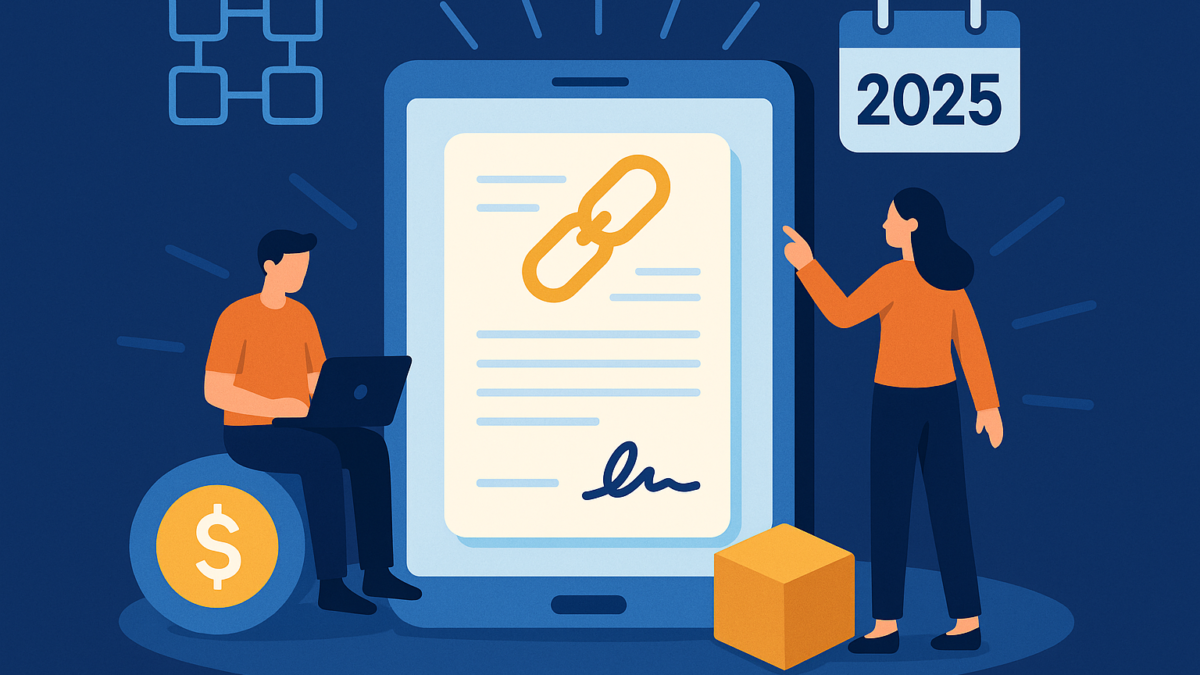Smart Contracts: What They Are and Why They Matter in 2025
Table of Contents
Introduction
In a rapidly digitizing world, smart contracts have emerged as one of the most transformative innovations of blockchain technology. In 2025, they are no longer a futuristic concept—they’re actively reshaping industries like finance, real estate, healthcare, and supply chain management.
This article explores what smart contracts are, how they work, and why they are crucial for businesses looking to automate, secure, and streamline their operations.
What Are Smart Contracts?
Smart contracts are self-executing agreements written in code that automatically enforce the terms of a contract when predefined conditions are met. Unlike traditional contracts, which require intermediaries or manual execution, smart contracts operate on blockchain networks—ensuring transparency, security, and immutability.
Key Features:
- Stored and executed on a blockchain (e.g., Ethereum, Solana)
- Tamper-proof and transparent
- Executes automatically without third-party involvement
How Do They Work?
A smart contract contains:
- Conditions written in programming logic (e.g., “if X happens, then do Y”)
- Triggers to initiate the contract (e.g., payment received, delivery confirmation)
- Outcomes that execute once conditions are fulfilled
Once deployed, the contract cannot be altered, making it secure and trustless—two users can engage in a transaction without knowing or trusting each other.
Benefits in 2025
Smart contracts offer several strategic advantages:
- Automation: Eliminate manual steps and reduce the need for intermediaries.
- Cost Savings: By removing middlemen such as lawyers or brokers, companies can save on transaction costs.
- Security and Transparency: Blockchain records cannot be changed, ensuring data integrity and transparency.
- Speed and Efficiency: Processes like payments, verification, and reporting can happen in real time.
- Reduced Risk of Fraud: Since execution is automatic and based on blockchain logic, human error and fraud are minimized.
Real-World Applications in 2025
Financial Services
- Automating loan disbursements
- Managing insurance claims
- Processing cross-border payments
Real Estate
- Tokenized property ownership
- Automating lease agreements
- Streamlined escrow transactions
Supply Chain
- Tracking goods from origin to delivery
- Verifying quality and compliance standards
- Automating payments upon delivery confirmation
Healthcare
- Managing patient consent
- Securing medical records
- Automating insurance settlements
Challenges and Considerations
Despite their potential, smart contracts face a few challenges in 2025:
- Legal Recognition: While many jurisdictions are adopting blockchain-friendly laws, not all recognize smart contracts as legally binding.
- Bugs and Security Risks: Coding errors can lead to exploits. Audits are critical.
- Scalability: High usage can lead to network congestion, especially on Ethereum.
- Oracles Dependency: Smart contracts need external data (from oracles), which can be a point of failure.
How to Get Started
If you’re considering implementing smart contracts, follow these steps:
- Identify Use Case: Start with repetitive, logic-based processes (e.g., invoice payments).
- Choose a Blockchain: Popular platforms include Ethereum, Binance Smart Chain, and Polygon.
- Work with Developers: Collaborate with smart contract developers or platforms like Chainlink or OpenZeppelin.
- Test Thoroughly: Run sandbox tests and audits before deploying live contracts.
- Ensure Compliance: Stay updated with local regulations around digital contracts and blockchain.
The Future
In 2025 and beyond, smart contracts are expected to:
- Integrate with AI and IoT for smarter automation
- Power Decentralized Autonomous Organizations (DAOs)
- Replace traditional digital agreements in sectors like law, HR, and government services
- Enable global trade with programmable money and multi-party agreements
As blockchain matures, smart contracts will become foundational to how digital transactions and trust-based systems operate.
Final Thoughts
Smart contracts are more than just a blockchain trend—they’re a powerful tool for automating processes, reducing costs, and building trust in digital transactions. Businesses that embrace smart contracts in 2025 will gain a competitive edge in efficiency, transparency, and innovation.
Interested in implementing smart contracts for your business?
Subscribe to iTMunch for the latest blockchain updates or contact us to explore technology solutions that match your goals.
You May Also Like: How AI is Revolutionizing Legal Technology in 2025





